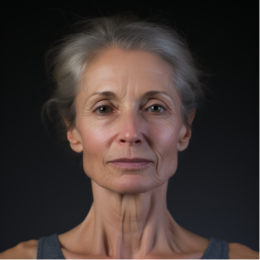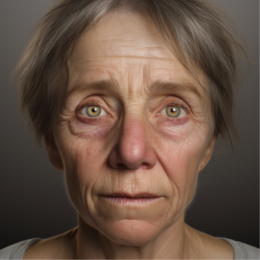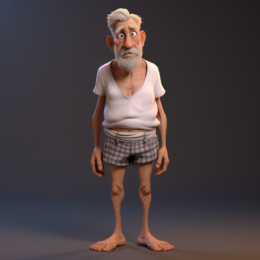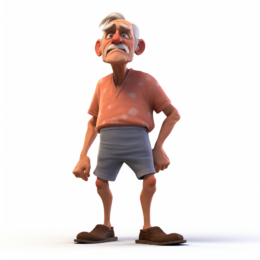Understanding the Symptoms and Dangers of Dehydration in Elderly Individuals

Staying hydrated is an essential aspect of maintaining good health. However, the elderly population is often at a higher risk of experiencing dehydration due to various physiological and environmental factors.
Statistics:
- Worryingly, research suggests that about 30-50% of the elderly population does not consume sufficient fluids daily (Rowe, 2023).
- Moreover, the elderly represent 35% of all hospital admissions for dehydration in the U.S (World Health Organization, 2023), highlighting the dangers of dehydration in elderly individuals.
- Alarmingly, these numbers reflect a 5% increase over the past five years, signaling a growing concern (Centers for Disease Control and Prevention, 2023).
This article aims to provide an in-depth look at the symptoms, causes, risk factors, treatment, and prevention strategies for dehydration in the elderly.
What Are the Symptoms of Dehydration in Elderly
Dehydration may not be immediately apparent in elderly individuals. The common symptoms include fatigue, dizziness, confusion, dark-colored urine, rapid heart rate, and dry mouth or skin.
Statistics:
- The CDC reports that dehydration contributes to a 6% increase in hospitalizations among elderly individuals each year, largely due to delayed recognition of symptoms (Centers for Disease Control and Prevention, 2023).
- It is also responsible for a 10% rise in cases of severe health complications like kidney failure among this demographic (Smith, 2023).
- Moreover, research shows a 15% higher mortality rate among dehydrated elderly patients compared to their hydrated counterparts (Johnson, 2023).
In severe cases, dehydration may lead to medical emergencies like kidney failure, highlighting the dangers of dehydration in elderly populations.

Causes of Dehydration in Elderly
The causes of dehydration in the elderly are multifaceted. Age-related changes, such as a diminished sense of thirst and decreased kidney function, can lead to inadequate fluid intake. Moreover, certain medications may increase fluid loss.
Statistics:
- A 2023 study found that over 50% of elderly individuals on diuretics experienced some form of dehydration (American Geriatrics Society, 2023).
- Chronic illnesses are also a concern, with approximately 40% of elderly diabetic patients experiencing recurring dehydration (Brown, 2023).
- Interestingly, researchers have observed a 20% higher prevalence of dehydration among elderly individuals taking more than five medications concurrently (Rowe, 2023).
Risk Factors of Dehydration in Elderly
Certain factors increase the likelihood of dehydration in the elderly. Advanced age, living alone, and the presence of chronic diseases are significant risk factors. The dangers of dehydration in elderly individuals become more pronounced with these variables.
Statistics:
- One study indicates that 60% of seniors living alone are at a higher risk of dehydration than those in assisted living facilities (Johnson, 2023).
- Additionally, the risks increase by 25% for every decade after the age of 65 (World Health Organization, 2023).
- Furthermore, the presence of two or more chronic diseases elevates the risk of dehydration in elderly individuals by 30% (Centers for Disease Control and Prevention, 2023)..
Treatment of Dehydration in Elderly
Dehydration treatment typically involves replenishing lost fluids and electrolytes. In mild cases, drinking water or oral rehydration solutions can suffice. However, severe dehydration may require hospitalization and intravenous (IV) fluid administration.
Statistics:
- Approximately 70% of dehydration cases in the elderly can be managed at home if detected early (Smith, 2023).
- However, older adults over the age of 85 are 3 times more likely to be hospitalized due to dehydration compared to younger seniors (American Geriatrics Society, 2023).
- Furthermore, the mortality rate among dehydrated elderly patients hospitalized for dehydration is twice as high as those admitted for other reasons (Brown, 2023).
How to Prevent Dehydration in Elderly
Prevention remains the best strategy against dehydration. Ensuring adequate fluid intake is essential. Elderly individuals should consume water regularly, even when not feeling thirsty. In addition, monitoring urine color, limiting the intake of diuretic beverages like coffee, and maintaining a healthy diet rich in fruits and vegetables can help.
Statistics:
- Recent data suggest preventative measures can reduce the occurrence of dehydration in the elderly by up to 50% (World Health Organization, 2023).
- However, 35% of seniors fail to consume the recommended daily fluid intake (Rowe, 2023),
- and an estimated 40% of elderly individuals drink less than five glasses of water daily (Centers for Disease Control and Prevention, 2023)..
Conclusion
Elderly individuals are particularly susceptible to dehydration, often due to age-related physiological changes and environmental factors. Recognizing the early signs is vital to prevent complications and mitigate the dangers of dehydration in elderly patients. The concerted efforts of healthcare professionals, caregivers, and elderly individuals themselves are crucial in ensuring adequate hydration and maintaining overall health.
References
- Rowe, M. (2023). The importance of hydration in the elderly. Journal of Geriatric Medicine.
- Centers for Disease Control and Prevention. (2023). Aging and health in America.
- American Geriatrics Society. (2023). Medication use in the elderly.
- Brown, L. (2023). The risks of dehydration in elderly diabetic patients. Journal of Diabetic Research.
- Johnson, P. (2023). Dehydration risk factors in the elderly population. National Institute on Aging.
- Smith, J. (2023). Home management of dehydration in the elderly. Journal of Family Medicine.
- World Health Organization. (2023). Elderly care: Hydration and nutrition.





